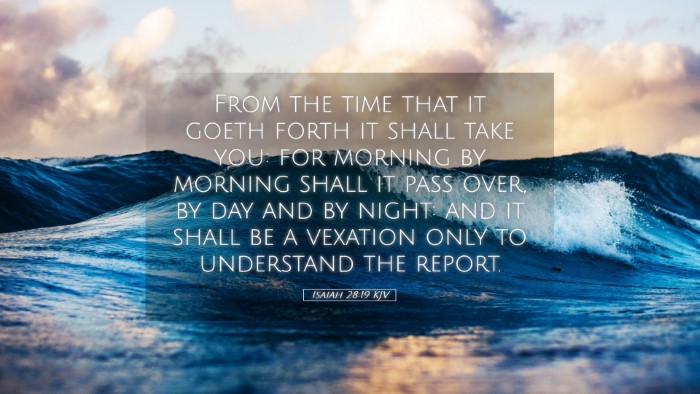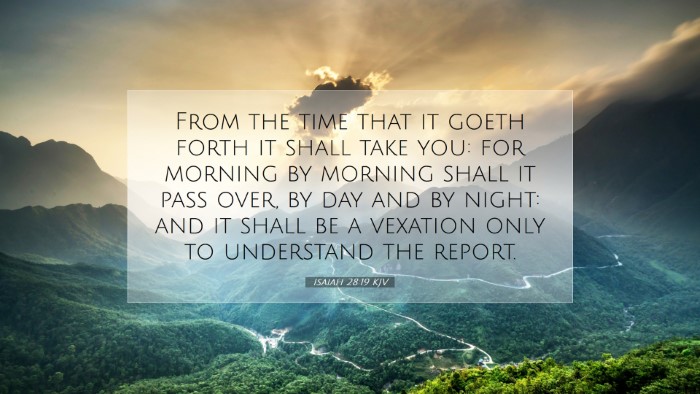Isaiah 28:19 Commentary
Verse: "From the time that it goeth forth it shall take you: for morning by morning shall it pass over, by day and by night: and it shall be a vexation only to understand the report."
Introduction
Isaiah 28:19 speaks to the relentless nature of divine judgment and the inescapable consequences of Israel's rebellion against God. It is essential to study this verse within the broader context of Isaiah’s prophetic message concerning the judgment and restoration of Israel. The verse serves as a poignant reminder of the reality that wisdom, once rejected, can become a source of torment to those who fail to heed its call.
Exegesis of the Text
In this passage, the prophet Isaiah describes the severity of God's message and its inevitable effect upon the people. The phrase "From the time that it goeth forth" indicates the immediate influence of God’s directives which, once delivered, will continue to confront the people.
Matthew Henry's Perspective
According to Matthew Henry, this verse illustrates the consistency with which divine warnings and messages are communicated. He notes the repetitive nature of God's judgments as "morning by morning" they come forth. High-handed sin leads to a high-handed punishment, and Henry emphasizes that the continual nature of this divine message can lead to great distress, especially when ignored. The distress arises from the inability to understand the severity of their situation and the ultimate consequence of rejection.
Albert Barnes' Insight
Albert Barnes expands on this thought by highlighting the concept of “vexation” as it relates to understanding the report of the Lord. He surmises that the people who ignore God’s instruction are trapped in a cycle of futility, where their hearts are hardened, and their eyes blinded to the truth of God’s judgment. Barnes interprets the “vexation” as a metaphor for the anguish that one experiences when faced with a truth that is undeniable yet unaccepted. This repeated experience serves as a severe warning to all who disregard God’s word.
Adam Clarke's Commentary
Adam Clarke delves deeper into the implications of this vexation. He asserts that the “report” refers not only to the message of judgement but also to the salvation that accompanies it. Clarke argues that while the message may be a source of distress for those unfaithful to God, it also offers the hope of redemption for those who listen and respond positively to the divine call. The duality of the message – as both judgment and hope – underscores the complexity of God's dealings with humanity.
Theological Implications
This verse raises several theological points worthy of consideration. First, it indicates the nature of God as a constant communicator who desires His people to return to Him. The repetitive warnings and the daily opportunities for repentance reflect God’s mercy intertwined with His justice.
Judgment and Mercy
Isaiah’s message reminds scholars and theologians that judgment serves the purpose of restoration. The unyielding reports signify not only condemnation but a call back to faithfulness and obedience. God’s patience is evident, as He allows time for repentance, but the inexorable nature of divine truth presses upon the conscience of the people.
Practical Application
For contemporary pastors and teachers, this passage serves as an admonition to be bold in preaching the truths of scripture, especially those concerning divine judgment. It challenges leaders to recognize that ignoring sin within their communities can lead to greater chaos and unrest.
- Understanding Consequences: Recognize the dangers of persistent disobedience.
- Emphasizing Repentance: Foster an environment where turning back to God is continually encouraged.
- Offering Hope: Alongside warnings of judgment, always present the hope of redemption found in Christ.
Conclusion
In summary, Isaiah 28:19 encapsulates key themes of divine judgment, human disobedience, and the ongoing call to righteousness. Commentators Matthew Henry, Albert Barnes, and Adam Clarke provide essential insights that remind us of the constancy of God’s communication with humanity about sin and grace. Each utterance of God carries weight; therefore, the faithful must adhere to His word, understanding both its implications and the hope it offers. This balance will enrich the spiritual understanding and pastoral practice aimed at leading the faithful toward deeper discipleship and responsiveness to God's unwavering call.


